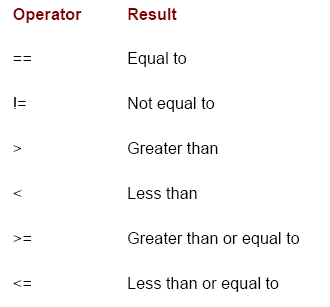Relational Operators in Java
By: Jagan in Java Tutorials on 2007-09-07
Therelational operatorsdetermine the relationship that one operand has to the other. Specifically, they determine equality and ordering. The relational operators are shown here:
The outcome of these operations is abooleanvalue. The relational operators are most frequently used in the expressions that control theifstatement and the various loop statements.
Any type in Java, including integers, floating-point numbers, characters, and Booleans can be compared using the equality test,==, and the inequality test,!=. Notice that in Java (as in C and C++) equality is denoted with two equal signs, not one. (Remember: a single equal sign is the assignment operator.) Only numeric types can be compared using the ordering operators. That is, only integer, floating-point, and character operands may be compared to see which is greater or less than the other. As stated, the result produced by a relational operator is abooleanvalue.

For example, the following code fragment is perfectly valid:
int a = 4;
int b = 1;
boolean c = a < b;
In this case, the result ofa<b(which isfalse) is stored inc.
If you are coming from a C/C++ background, please note the following. In C/C++, these types of statements are very common:
int done;
// ...
if(!done) ... // Valid in C/C++
if(done) ... // but not in Java.
In Java, these statements must be written like this:
if(done == 0)) ... // This is Java-style.
if(done != 0) ...
The reason is that Java does not define true and false in the same way as C/C++. In C/C++, true is any nonzero value and false is zero. In Java,trueandfalseare nonnumeric values which do not relate to zero or nonzero. Therefore, to test for zero or nonzero, you must explicitly employ one or more of the relational operators.
Add Comment
This policy contains information about your privacy. By posting, you are declaring that you understand this policy:
- Your name, rating, website address, town, country, state and comment will be publicly displayed if entered.
- Aside from the data entered into these form fields, other stored data about your comment will include:
- Your IP address (not displayed)
- The time/date of your submission (displayed)
- Your email address will not be shared. It is collected for only two reasons:
- Administrative purposes, should a need to contact you arise.
- To inform you of new comments, should you subscribe to receive notifications.
- A cookie may be set on your computer. This is used to remember your inputs. It will expire by itself.
This policy is subject to change at any time and without notice.
These terms and conditions contain rules about posting comments. By submitting a comment, you are declaring that you agree with these rules:
- Although the administrator will attempt to moderate comments, it is impossible for every comment to have been moderated at any given time.
- You acknowledge that all comments express the views and opinions of the original author and not those of the administrator.
- You agree not to post any material which is knowingly false, obscene, hateful, threatening, harassing or invasive of a person's privacy.
- The administrator has the right to edit, move or remove any comment for any reason and without notice.
Failure to comply with these rules may result in being banned from submitting further comments.
These terms and conditions are subject to change at any time and without notice.
- Data Science
- Android
- React Native
- AJAX
- ASP.net
- C
- C++
- C#
- Cocoa
- Cloud Computing
- HTML5
- Java
- Javascript
- JSF
- JSP
- J2ME
- Java Beans
- EJB
- JDBC
- Linux
- Mac OS X
- iPhone
- MySQL
- Office 365
- Perl
- PHP
- Python
- Ruby
- VB.net
- Hibernate
- Struts
- SAP
- Trends
- Tech Reviews
- WebServices
- XML
- Certification
- Interview
categories
Related Tutorials
Read a file having a list of telnet commands and execute them one by one using Java
Open a .docx file and show content in a TextArea using Java
Step by Step guide to setup freetts for Java
Of Object, equals (), == and hashCode ()
Using the AWS SDK for Java in Eclipse
DateFormat sample program in Java
concurrent.Flow instead of Observable class in Java
Calculator application in Java
Sending Email from Java application (using gmail)
Comments